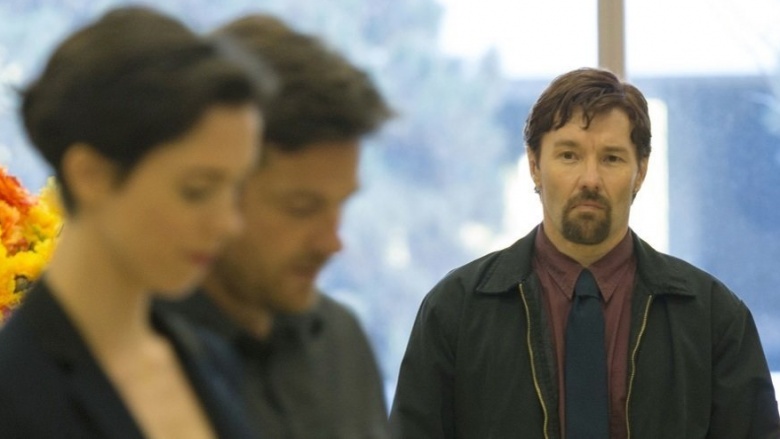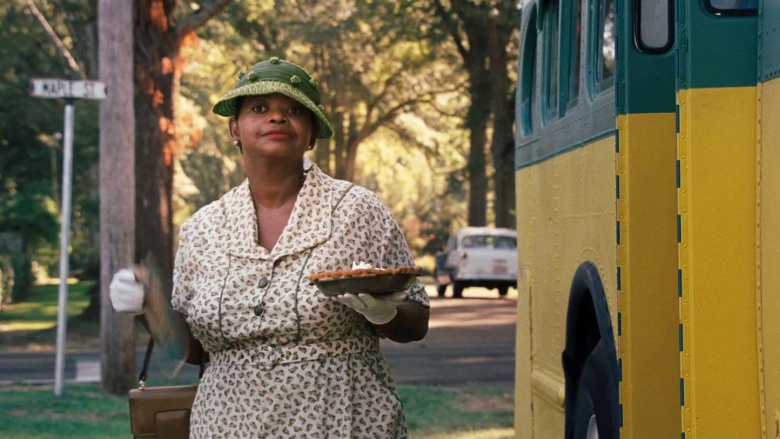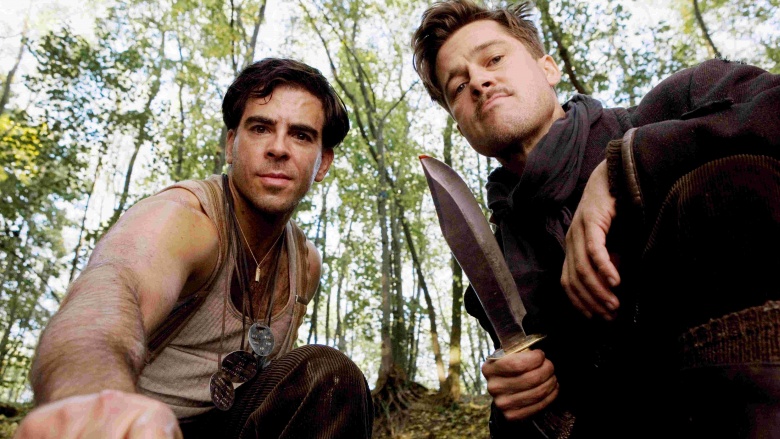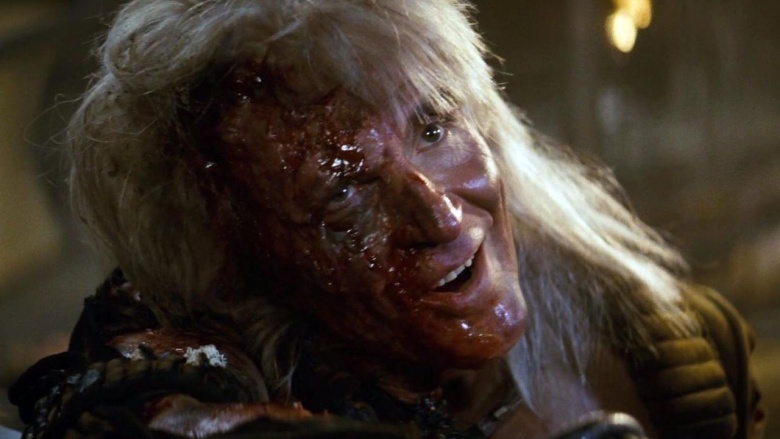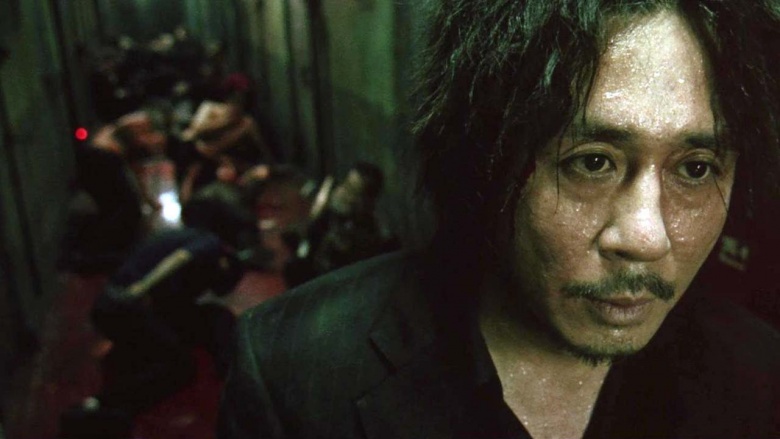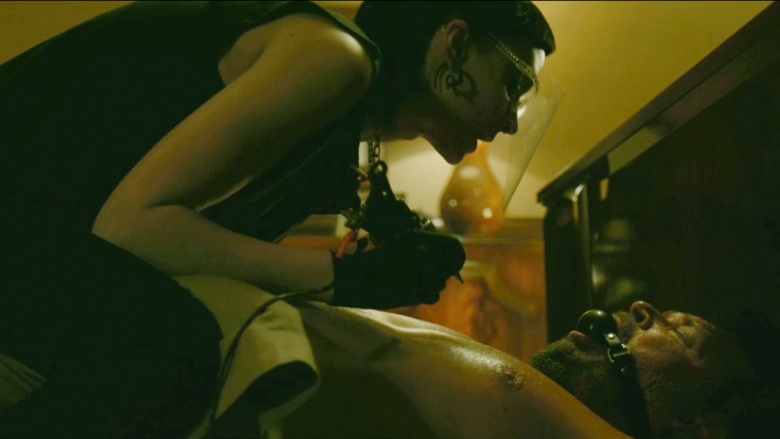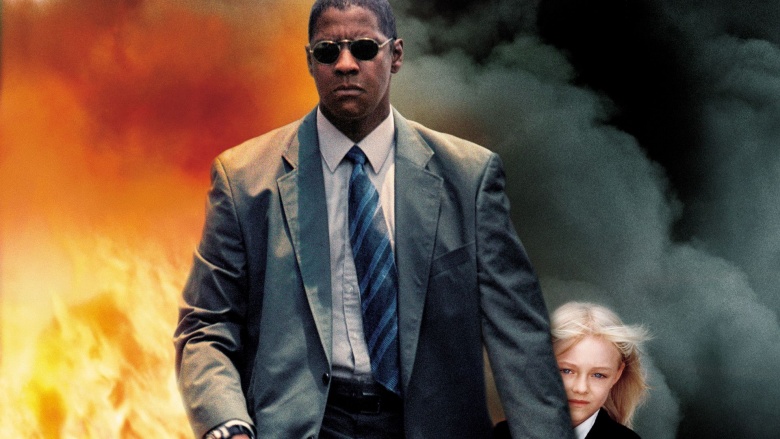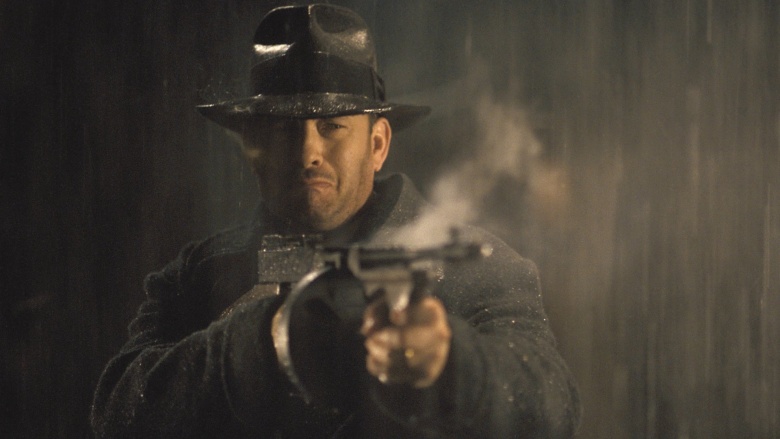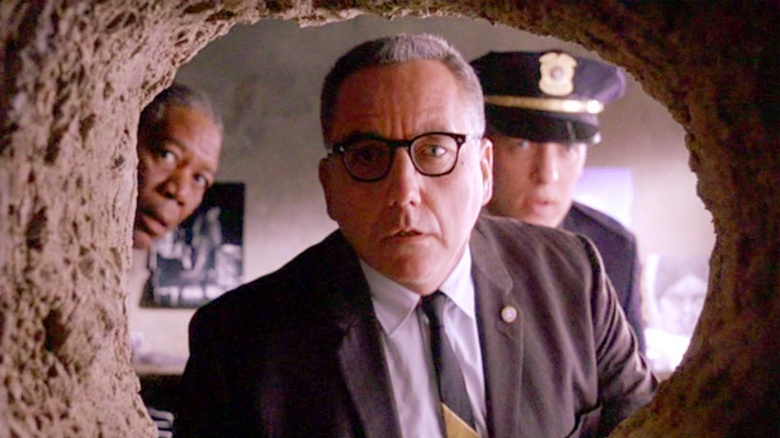The Greatest Acts Of Revenge In Movie History
Revenge might be a dish best served cold, but these films delivered fire with their pivotal moments of payback. Whether it was an entire film's worth of elaborate plotting and execution (so to speak) or a single moment of sweet recrimination, these movies delivered some of the all-time tastiest theatrical moments of spite. Here's how.
The Gift
Joel Edgerton made his triumphant directorial debut with 2015's The Gift, which he also wrote and starred in as Gordo, a seemingly sad sod who runs into an old high school acquaintance named Simon (Jason Bateman) and turns into something of an unwanted shadow for the man and his wife Robyn (Rebecca Hall).
Eventually, Gordo's kookiness becomes more worrisome than weird, but before the audience can quite write him off as a villain, Edgerton turns the tables in ways that are both artful and eerily unpredictable. As secrets from Simon's past (and present) come to light, Gordo steps up his psyche-unraveling campaign of terror—which includes sending Simon footage of his wife being drugged and potentially molested by Gordo nine months before the birth of his newborn baby. In long-overdue retaliation for a casual act of cruelty that caused Gordo unfathomable pain, he plants a seed in Simon's mind about what happened to Robyn after the camera stopped rolling ... and whether his wife actually carried his child in the first place. Now that's what you call a mind game.
The Help
Minny Jackson (Octavia Spencer) might have been reluctant to talk about the "terrible, awful" thing she did to Hilly Holbrook (Bryce Dallas Howard) in the 2011 screen adaptation of Kathryn Stockett's The Help, but we're more than willing. In the story, which is set smack dab in the middle of Mississippi during the civil rights movement of the '60s, Minny is long-suffering maid to the horrible Hilly, the self-declared moral authority around town who leads the community charge to segregate in-home bathrooms.
Minny is fired by Hilly for using the guest restroom rather than brave a storm to access the outhouse facilities she's been instructed to use, but she makes Hilly eat her cruel words by cooking her a chocolate pie that contains a new special ingredient: Minny's poop. It sounds foul, but it's actually quite a delicious moment to watch as Hilly's brain catches up with her ears and understands what she's just been told about the dessert she's still ravenously chowing down. Yum.
Inglourious Basterds
Vigilante justice is an essential element in many of Quentin Tarantino's movies, but with respect to the many other classic comeuppances contained in his collection, Inglourious Basterds has perhaps the largest amount of satisfying, albeit revisionist, moments of all.
People have long philosophized over whether they'd kill Hitler if given the gift of time travel. Basterds offers Tarantino's blood-soaked answer with an alternate take on World War II that plays out with humor, hard-hitting savagery, and a multi-faceted, utterly explosive payload moment that just about everyone can appreciate, since those on the receiving end are some of history's most reprehensible villains. From Shosanna (Mélanie Laurent)'s orchestrated torching of the Führer alongside an entire audience of Nazi loyalists, to Donny "Bear Jew" Donowitz (Eli Roth)'s merciless beat-down of an remorseless SS officer, to Lt. Aldo Raine (Brad Pitt)'s swastika-branding of Hans "Jew Hunter" Landa's forehead, Basterds dispenses justice in ways that only make the intense violence that much more entertaining.
Star Trek II: The Wrath of Khan
Trekkies had an extra reason to get excited about the return of Khan Noonien Singh (Ricardo Montalban) in the second cinematic Star Trek iteration: it was in real time. The megalomaniacal Khan had been exiled by Captain Kirk (William Shatner) in a Star Trek TV episode called "Space Seed" 15 years before for his part in starting the superhuman Eugenics War on Earth in the 20th Century. He was sent to live on Ceti Alpha V, whose ecosystem was later destroyed by another planet's explosion, killing Khan's wife in the process. In Star Trek II, Khan has not only escaped prison, he's stolen the Genesis device, which can make barren planets habitable.
Khan successfully overtakes Kirk's ship, the Enterprise, and threatens Kirk's crew in an effort to obtain all the information they have on the Genesis. Spock (Leonard Nimoy) sacrifices himself to save the Enterprise, which has been hobbled and flooded with radiation from an earlier attack, and needs to escape the detonation from Khan's eventual use of the device. In the process, Khan creates a new planet that is indeed habitable—and creates a whole new world of mess for the crew to grapple with in Star Trek III: The Search for Spock.
Oldboy
Park Chan-wook's celebrated second installment to The Vengeance Trilogy is considered a masterpiece among gore enthusiasts, and presents one of the most complex revenge stories cinema has yet to offer. At first, it seems like the victim of the story is Oh Dae-su (Choi Min-sik), who's been imprisoned for 15 years in a hotel room without knowing why, watching helplessly as the news of his wife's murder flashes by on the news. Once he's suddenly released, he tries to locate his long-lost daughter, who'd been just four when he was abducted, but to no avail.
Along the way to discovering the details of his wealthy captor, he comes to realize he'd actually caused grave harm to the man who paid for his kidnapping, Lee Woo-jin (Yoo Ji-tae). It turns out he'd put Woo-jin's incestuous relationship with his sister on the gossip circuit, thus causing her to commit suicide out of shame. It's then that Dae-su learns that the woman he's fallen in love with during his quest for vengeance is actually his own daughter, who'd been coaxed into being at the right place at the right time to ensure Dae-su would suffer an indignity similar to Woo-jin's. Major ouch.
The Girl with the Dragon Tattoo
Both the Swedish and American film adaptations of The Girl with the Dragon Tattoo gave fulfilling screen life to Stieg Larsson's complex literary heroine Lisbeth Salander (played by Noomi Rapace and Rooney Mara, respectively). Part of their success stems from the fact that in each version, the trauma the character endures at the hand (and other body parts) of her assigned legal guardian, Nils Bjurman, is as uncompromising on the screen as it was in the books, underscoring the viewer's hunger to see Lisbeth achieve her richly deserved vengeance.
After she's repeatedly taken advantage of by Bjurman, he violently rapes her and threatens to compromise her funds and freedom if she turns him in for the crime. Rather than running to the authorities with her secret recording of the incident and being assigned another new guardian, she instead sets out to secure her own freedom—but only after delivering Bjurman his own bodily violation, which includes sodomy and an abdominal tattoo signifying his status as a sadistic rapist and pig. (She also tracks him down after he visits a tattoo removal shop, to ensure that this ink really does stay permanent.)
Wanted
Let's be real here. Who wouldn't want the opportunity to tell their worst boss ever to go *bleep* him or herself in front of the entire office? That was just the beginning of the many wrong-rightings enjoyed by unwitting assassin protege Wesley (James McAvoy) in the comic adaptation flick Wanted. He also got the chance to get back at his cheating ex-girlfriend by making out with the badass beauty Fox (Angelina Jolie) right in front of her, and arguably the best moment of all was when he dealt with her paramour, who also happened to be his former co-worker and braggadocious best friend Barry (Chris Pratt).
After he's made Jerry Maguire's office exit speech seem as docile as a Post-It smiley face left on the company fridge, Wesley heads for the exit with his ripped-out computer keyboard in hand. Barry, who's befuddled by what Wesley's just said to their boss, goes for the high five and gets a QWERTY to the face instead. Poetically, the letter keys which splatter in sequence across the screen after the shot complete a popularly profane send-off, the U of which is made up of Barry's dislodged tooth. That had to hurt.
Man on Fire
A father's love is supposed to know no bounds, but when it came to one businessman, a cool five million was enough to put his own daughter in harm's way. In this 2004 action-drama, a retired CIA operative named John Creasy (Denzel Washington) takes a gig as the bodyguard-slash-babysitter of a nine-year-old girl named Pita (Dakota Fanning), but comes to find that the job entails a lot more than mere child's play.
When the girl is kidnapped in Mexico, the injured Creasy gets to work finding and systematically slaughtering her captors, but in the end, he discovers that her father had staged her abduction for the sake of collecting his own ransom money—and she's in a lot more danger than even he could have anticipated. Creasy, who'd left one in the chamber of his gun after it misfired during his own suicide attempt, hands the weapon over to the man who caused all of this mess, and guess what? It works this time. (Of course, Creasy also rescues the girl...and sacrifices himself in the process of returning her safely to her mother).
Road to Perdition
Sam Mendes' 2002 adaptation of the Max Allan Collins graphic novel was an enthralling example of what happens when a man's family is made to pay for his sins. The Depression era drama followed Mafia enforcer Michael Sullivan (Tom Hanks) seeking justice for his wife and child—murdered by his pseudo-brother Connor (Daniel Craig) after Sullivan's elder son Michael Jr. (Tyler Hoechlin) bears witness to Connor committing homicide.
With Michael Jr. in tow, Sullivan works his way through the deadly crime syndicate to find Connor and make him pay. The eponymous road to Perdition, which is a nod to the location of the bitter climax, is filled with treachery and devastation, but in the end, the parties who deserve it get theirs—even Sullivan, whose son watches him pay the ultimate sacrifice for his life of violence.
Shawshank Redemption
The saga of Andy Dufresne's (Tim Robbins) false imprisonment at Shawshank made for one of—if not the—best films of its decade, and part of its enduring intrigue is the utter beauty with which Andy's escape-slash-payback sequence plays out. Yes, the man who actually committed the crime for which Andy was convicted ultimately finds himself in jail, but he isn't the one who earns Andy's true wrath.
Shawshank Warden Norton (Bob Gunton) had the opportunity to free Andy after evidence of his wrongful imprisonment came to light, but instead of doing so, he punished Andy further—all the while, relying on Andy to cook his books so he can launder money using a fictional alias. After Andy literally crawled his way through the walls and on to freedom, though, it's the warden who suffered; not only did Andy adopt the warden's own alias to siphon off his unearned loot, but he turned evidence of Norton's crimes over to the feds, leaving the warden no choice but to off himself in his office. Yow.

